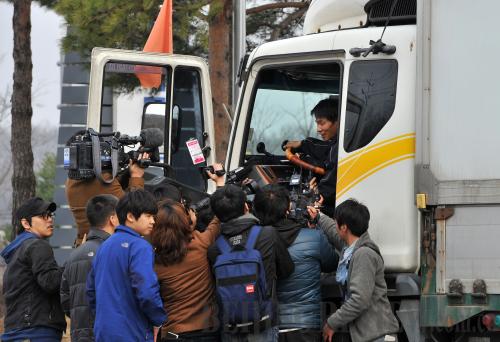|
 |
|
SEVERED TIES: Reporters interview a driver arriving from North Korea's Kaesong industrial complex in the South Korean border city of Paju on April 8, the day Pyongyang declared it would close the joint industrial park (XINHUA/AFP) |
Tensions on the Korean Peninsula finally seem to be easing. President of the Republic of Korea (ROK) Park Geun Hye said on April 11 that Seoul would conduct dialogue with Pyongyang and offer humanitarian assistance. During his recent visits to China and South Korea, U.S. Secretary of State John Kerry also expressed a willingness to hold face-to-face talks, on condition that the Democratic People's Republic of Korea (DPRK) meets its international obligations, halts missile tests and abandons its nuclear program.
At the same time, a jubilant atmosphere prevailed in the DPRK as the country marked the one-year anniversary of Kim Jong Un's assumption of office. Although it condemned the ROK's dialogue offer, its tone was less harsh than previous angry utterances about war that occurred for about a month. DPRK Ambassador to China Ji Jae Ryon published an article on April 15, writing that his country will fight back against Washington's provocations using nuclear weapons. But a closer look at these sharp words shows hidden message: the DPRK will not be the first to open fire.
A new interaction between the United States and the DPRK came on April 18, when the DPRK's defense commission openly listed preconditions for talks. The commission said that the DPRK noted that the United States and the ROK have expressed willingness to defuse the crisis through negotiations and diplomatic efforts, urging Washington and Seoul to cease provocations and cancel nuclear war games designed to intimidate the DPRK.
In response, White House spokesman Josh Earnest expressed on the same day the Obama administration's openness to "authentic and credible" negotiations with the DPRK. "It's going to require clear signals from the North Korean regime—clear signals we haven't seen so far—to live up to their international obligations and to keep their commitments to end their nuclear weapons program," he said.
Relaxation
The current relaxation is encouraging, showing that the "balance of terror," which has guided the Korean Peninsula situation over the past decades, is still working. In fact, none of the parties involved truly wishes to start a war. There are at least three factors that have contributed to the easing of tensions on the peninsula: China's efforts to prevent the situation from escalating, Washington's refraining from taking further provocations against the DPRK and restraining of the ROK and Pyongyang's self-restraint.
The White House and Pentagon officials disclosed to the media in early April that the United States had suspended plans to display U.S. military might to Pyongyang, including an intercontinental missile test.
China's role in defusing tensions on the Korean Peninsula should not be underestimated. Chinese leaders declared the country's opposition to any actions that would further rile the regional situation. Chinese President Xi Jinping said at the opening ceremony of the Boao Forum for Asia on April 7 that no one should be allowed to throw a region and even the world into chaos for selfish gains.
"China will continue to play a constructive role in addressing regional and global hotspot issues, encourage dialogue and talks for peace, and work tirelessly to solve the relevant issues properly through dialogue and negotiations," Xi added.
International observers considered these remarks as the highest-level statements China has made on the Korean Peninsula situation.
| 